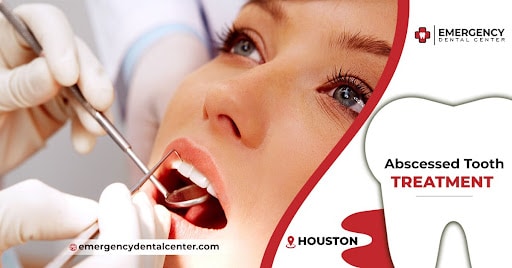A tooth abscess is a pocket of pus caused by a bacterial infection that may occur in various places around a tooth. The following three types of infections typically cause abscesses:
- Gingival
- Periodontal
- Periapical
This condition usually causes moderate to severe pain, and the pain may also radiate to your ear and neck. An abscessed tooth may even turn into a serious condition if left untreated. Continue reading to learn more about the abscessed tooth symptoms, causes, diagnosis, and treatment.

Symptoms
Throbbing pain near a tooth or in your gum is the most significant symptom of an abscessed tooth. Its other symptoms are:
- Pain that gets worse over time, especially when you lie down
- Pain that radiates to your ear, jaw, or neck
- Experiencing pain when biting or chewing
- Tooth sensitivity
- Bad breath
- Swollen or red gums, etc.
Causes
Anything that makes an opportunity for bacteria to get into your gums or teeth may lead to a dental abscess. The type of abscess is usually determined by the way it happens. It includes:
- Periapical abscess: The pulp of a tooth is its inner part which is quite soft because it is made up of nerves, blood vessels, and connective tissues. Through a cavity, bacteria may enter the pulp and cause a periapical abscess.
- Gingival abscess: It occurs when a foreign body like toothbrush bristle or food debris gets embedded in the middle of the gums.
- Periodontal abscess: Gum diseases generally cause a periodontal abscess. However, it can also be the result of an injury.
Diagnosis
You must visit your nearby dentist for abscessed tooth treatment in Houston or other cities if you experience sharp pain near a tooth or in your gums. Dentists usually recommend an x-ray to identify the source of any dental disease. Your dentist may also perform the same to find the causes and determine how far the infection has spread.
Your dentist may also recommend doing a CT scan if the x-ray report suggests that the infection has spread to other areas like the neck or ear.
Thermal tests have also appeared as an excellent way to determine the condition of pulpal tissues health. Your dentist may also press or tap your teeth because abscessed teeth are sensitive to touch and press.
Treatment
You must seek treatment immediately if you are suffering from abscessed tooth pain. The primary goal of abscessed tooth treatment in Houston or any other city is to clear up the infection. Depending on your abscess type and its severity, your dentist will choose a treatment method from the below options:
- Draining the abscess is a highly effective treatment method in which dentists make a tiny cut in the abscess to remove the pus. After draining the abscess, dentists usually use saline solution to clean the area.
- A root canal is another useful way of treating an abscessed tooth. This is the process of drilling into the affected tooth to remove the abscess and other infected pulp, if present.
- Dentists also recommend taking antibiotics to treat an abscessed tooth to those who have a weakened immune system. You may also be prescribed to take oral antibiotics if your infection has heavily spread even beyond the abscessed area.
Along with the above-mentioned treatment options, foreign object removal, as well as tooth extraction, are also considered as the other useful methods of treating an abscessed tooth. We request you to visit the Emergency Dental Center if you are suffering from throbbing pain in your gums or near a tooth. We provide the best abscessed tooth treatment in Houston that focuses on relieving pain by clearing up the infection. Call us now to schedule an appointment and help us to protect your oral health.

